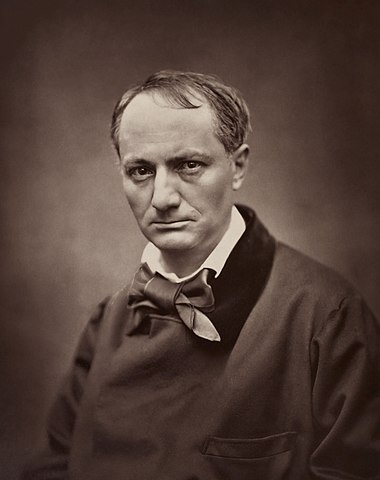Beauty In French – Introducing The Poet, Charles Baudelaire Posted by John Bauer on Sep 5, 2018 in Culture
Learning about la culture (culture) is an important part of learning une langue (a language). For more modern music or movies, it can be easy to appreciate and often fun to use while studying French. However, looking at l’histoire (history) and all l’art et la poésie (the art and poetry) over the centuries, or sometimes millennia, can make it hard to know where to dive in and start exploring. Having bits of la culture presented in a way that is easy to digest helps take your understanding of French and French culture even further!
A couple weeks ago I introduced everyone to la chanteuse française (the French singer), Joyce Jonathan. In the song I shared, Ça Ira, la chanteuse makes a reference to a French literary figure in les paroles (the lyrics):
J’aime les airs assurés que tu empruntes aux plus beaux monuments
I like the self-confident look you borrow from the boldest monuments
Le vers (the verse) is meant to reflect un poème by Charles Baudelaire, a famous French poet.
Alors qui est Charles Baudelaire ?
So who is Charles Baudelaire?
Charles Baudelaire lived in 19th century Paris and that romantic setting combined with the development of industrialization shaped his artistic style. Baudelaire was part of a new artistic movement that looked at l’art et la poésie slightly differently for the times and he is credited with coining the term la modernité (modernity) to describe the strange feel of the new fast paced city.
The context of le 19e siècle (the 19th century) shines through in Baudelaire’s works with its distinctly surreal feel and total embrace of artistic expression. That may sound confusing, but en pratique (in practice) that translates into la poésie (poetry) more concerned with abstract concepts than physical descriptions.
An interesting side note to Baudelaire‘s life is his work on some of the first French translations of Edgar Allen Poe!
In Ça Ira, Joyce Jonathan references un poème called La Beauté (The Beauty). La Beauté is part of the larger collection, Les Fleurs du mal (The Flowers of Evil), and was released in 1857. Although Les Fleurs du mal is seen as a classic aujourd’hui (today), upon its release it received mixed reviews.
Most people agreed there were amazing pieces in the collection, but many also saw some of his work to be in bad taste or even vulgar. Baudelaire‘s reaction to the critics was to insist that la beauté (beauty) and la moralité (morality) are two completely separate ideas and it is not the job of an artist to reconcile the two.
La Beauté is about what Baudelaire feels it means to be un poète. It may be hard to follow, but trying to understand and appreciate the flowery language of Baudelaire will improve your French. So even if you struggle, take a moment to read and listen to le poème and enjoy some beautiful 19th century poetry!
Voici La Beauté avec une traduction anglaise :
| La Beauté |
Beauty |
| Je suis belle, ô mortels! comme un rêve de pierre, | I am fair, O mortals! like a dream carved in stone, |
| Et mon sein, où chacun s’est meurtri tour à tour, | And my breast where each one in turn has bruised himself |
| Est fait pour inspirer au poète un amour | Is made to inspire in the poet a love |
| Éternel et muet ainsi que la matière. | As eternal and silent as matter. |
| Je trône dans l’azur comme un sphinx incompris; | On a throne in the sky, a mysterious sphinx, |
| J’unis un cœur de neige à la blancheur des cygnes; | I join a heart of snow to the whiteness of swans; |
| Je hais le mouvement qui déplace les lignes, | I hate movement for it displaces lines, |
| Et jamais je ne pleure et jamais je ne ris. | And never do I weep and never do I laugh. |
| Les poètes, devant mes grandes attitudes, | Poets, before my grandiose poses, |
| Que j’ai l’air d’emprunter aux plus fiers monuments, | Which I seem to assume from the proudest statues, |
| Consumeront leurs jours en d’austères études; | Will consume their lives in austere study; |
| Car j’ai, pour fasciner ces dociles amants, | For I have, to enchant those submissive lovers, |
| De purs miroirs qui font toutes choses plus belles: | Pure mirrors that make all things more beautiful: |
| Mes yeux, mes larges yeux aux clartés éternelles! | My eyes, my large, wide eyes of eternal brightness! |
| – Charles Baudelaire | – Translation by William Aggeler |

Build vocabulary, practice pronunciation, and more with Transparent Language Online. Available anytime, anywhere, on any device.




